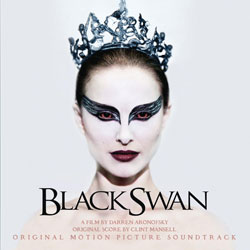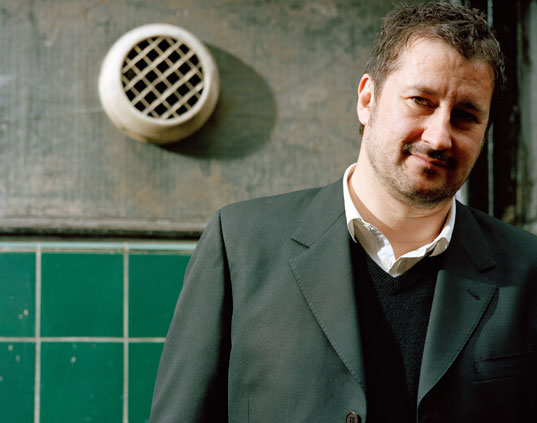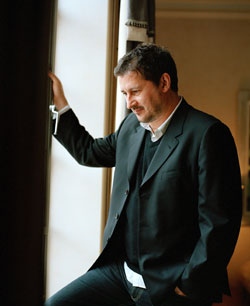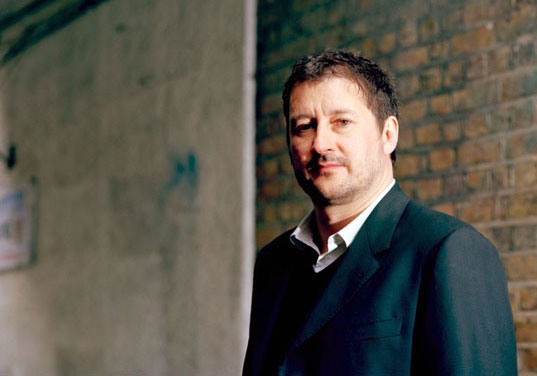
BLACK SWAN, SOUNDTRACK SCORE (CD)
Release date (UK): January 17th 2011
Running time: 52 minutes
Composer: Clint Mansell
If you’ve seen Π, Requiem for a Dream, The Fountain and The Wrestler, then you’ll know the work of director Darren Aronofsky, and the music of Clint Mansell.
The English composer and musician, formerly of the band Pop Will Eat Itself, was introduced to soundtrack scoring by Aronofsky when he hired him to compose the music for Π. From then on Mansell has scored for a diverse range of films including Suspect Zero and Moon. In part 1 of our interview we have a chat about his latest score, Black Swan.

STATIC MASS: At any time during the production, did you find yourself getting in touch with your Black Swan?
CLINT MANSELL: I think the argument posited by the film is that that’s what an artist does, so I guess to some degree… I’ve been doing this for so long now, that I don’t know if I’d ever get out of Black Swan mode! It takes such a lot of commitment and application to get the results I want to get that I’m always somewhere on the borderline insane!
STATIC MASS: How would you describe your familiarity with Tchaikovsky and Swan Lake prior to Black Swan?
CLINT MANSELL: I saw Matthew Bourne’s version of Swan Lake about five years ago and that was my first real exposure. I’m not from a classical world, so it’s been a voyage of discovery from the start. I didn’t learn it off by heart or back to front and upside down…I didn’t want to be too close to it where I wouldn’t be able to bounce off it and go somewhere new with it.
STATIC MASS: Would you say this has been your biggest challenge so far?
CLINT MANSELL: They’re all big challenges; this is just a different challenge because you’re working with a piece of music which is world renowned. On the one part you want to have respect for it but on the other, to do anything worthwhile with it you have to take a punk rock attitude and disrespect it. Strip it down and rebuild it to make it a worthwhile exercise in what you’re trying to do. If it was just a straight reworking or replaying of the music of Swan Lake it would be kind of pointless. The challenge was to bring something of ourselves to it, but also if Tchaikovsky was to hear it one day he’d be like “Wow! They did some impressive stuff with my work!”
STATIC MASS: What kind of ideas did you and Darren talk about at the beginning?
CLINT MANSELL: The first idea we had was to take Tchaikovsky’s music for the ballet and to deconstruct it for the modern age. Ballet music is so evocative; it’s telling you everything emotionally about the story which is different from film music these days. Film music is more about underscoring the emotion and supporting what’s happening on the screen because you’ve got the dialogue and the images. With the first few pieces you could just tell that it was going to work, so we pursued that train.
STATIC MASS: How long did the writing and the preparation take?
CLINT MANSELL: I started before they started filming. All the dance sequences and rehearsals needed Swan Lake music for them to use on camera. I worked with Benjamin Millepied [the choreographer] to get the passages he wanted to use… The tempo, timing and performances he wanted the dances to work with.
A lot of that was transcribing the ballet into notation, getting it into the computer, working with the elements… Just a lot of experimentation. All in all, it was about ten months.

STATIC MASS: How was it recording with the orchestra?
CLINT MANSELL: We recorded the score at AIR Studios in London. It’s all mapped out, written and arranged, and we’ve demoed it and everybody knows what it is, but then it’s getting the players to interpret it and understand it. When we started hearing it back it was incredible. They were really amazing, but then Swan Lake is amazing piece of music so it’s gonna sound pretty good!
The London players to my mind are the best in the world! They are masters of performance, interpretation and focus – that’s one of the biggest things! Sight reading from an orchestra is what helps you get the performance quickly and with a couple of run-throughs they’ve got it.
STATIC MASS: Were there any particular pieces which turned out to be more difficult than you expected?
CLINT MANSELL: They were all difficult because it’s such a particular arrangement and there are long passages of music; five or six minutes long and to get it just right it’s a lot of work. We had three days to do it, to record seventy minutes of music, and every second that you’re on the stage is costing somebody some money. It’s a really draining experience because you have to be focused and alert; listening to everything when you’ve got eighty people playing.
But there are times when you hear just a little bit that’s gone astray, so you have to focus. It sounded amazing but you have to craft it and shape it and get the dynamics sorted. It’s a complex piece of work.

STATIC MASS: Is the soundtrack the most definitive collection of Black Swan music or might there be a future release with more music?
CLINT MANSELL: With the CD, we tried to bring a comprehensive listening experience, not just have the music slapped in straight from the film. You’ll have repeating themes in the film which work in the context of the film but you don’t want to hear so much when you’re playing the CD. We go through everything and try to make a stand alone listening experience which evokes the film and gives it an all round satisfying beginning, middle and end. There probably are other pieces that are knocking around but I don’t know at this point whether I’ll be concerned about doing anything more with them.
STATIC MASS: I think a lot of fans will want to see and hear you perform this. Are there any plans for a live showcase?
CLINT MANSELL: I would love to do it. It would be quite a feat to put together, and the gigs and shows I’ve done so far I’ve absolutely loved doing them and definitely want to do more… but I don’t know when that’s going to be though.

STATIC MASS: The soundtrack as well as the film has brought a lot of attention to classical music and ballet as a result, do you feel that mainstream cinema has neglected this long enough?
CLINT MANSELL: Mainstream cinema is a big business and they tend to follow a certain pattern. If something is successful then they do ten copies of it because they know it’s probably going to sell so maybe you can expect a flurry of ballet or classically themed movies to follow Black Swan’s success. The thing is, with a guy like Darren, he’s always looking for something that turns him on or excites him and that tends to be something that’s not doing the rounds at this moment in time. It’s something that he’s found that excites him because he hasn’t been exposed to it before or its brought different feelings out for him that inspired him to move forward with it. We shall see what that means for the zeitgeist. I know Black Swan has been parodied now on Saturday Night Live and it was in an episode of 30 Rock, so maybe the classical world might not be happy with that sort of attention so who knows! Apologies then if that’s the case!
Stay tuned for part 2 of our interview with Clint Mansell where he talks about his upcoming projects!
Season 3 of True Blood picks up exactly where the last one left off; Bill proposing to Sookie. What happened next? Well, this is Bon Temps, so there will be blood!
Collapse is a documentary which looks at the crises of energy and money in a post peak oil world. Presented by investigative journalist Michael Ruppert.
Songs from the Second Floor (2000), Roy Andersson’s deadpan vision of a society coming apart at the seams, is the focus of this week’s feature by Dominic Walker.
Wes Craven returns as writer and director for the teen slasher My Soul To Take, introducing us to the Riverton Ripper and the unlucky seven he’s going to kill!
They say that in space no one can hear you scream, but in Ridley Scott’s Alien, we heard the screams from the Nostromo loud and clear with Ripley’s epic first battle.



































































